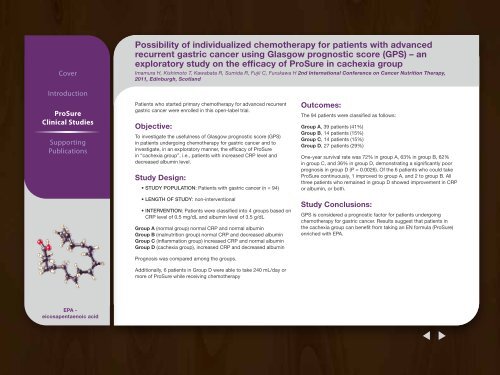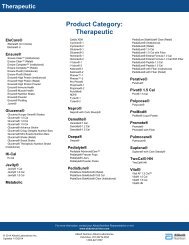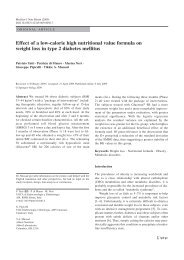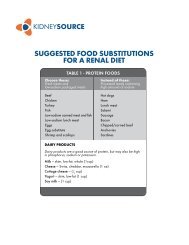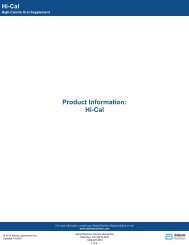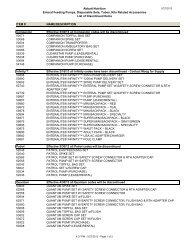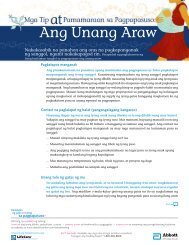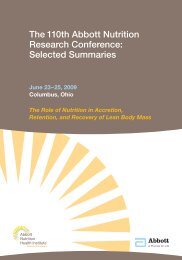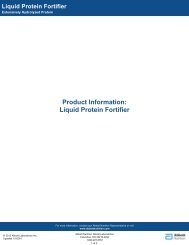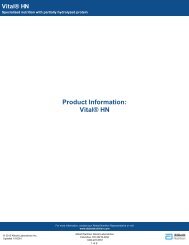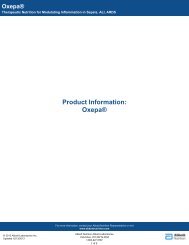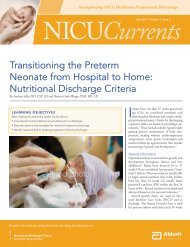Cover Introduction ProSure Clinical Studies ... - Abbott Nutrition
Cover Introduction ProSure Clinical Studies ... - Abbott Nutrition
Cover Introduction ProSure Clinical Studies ... - Abbott Nutrition
You also want an ePaper? Increase the reach of your titles
YUMPU automatically turns print PDFs into web optimized ePapers that Google loves.
<strong>Cover</strong>Possibility of individualized chemotherapy for patients with advancedrecurrent gastric cancer using Glasgow prognostic score (GPS) – anexploratory study on the efficacy of <strong>ProSure</strong> in cachexia groupImamura H, Kishimoto T, Kawabata R, Sumida R, Fujii C, Furukawa H 2nd International Conference on Cancer <strong>Nutrition</strong> Therapy,2011, Edinburgh, Scotland<strong>Introduction</strong><strong>ProSure</strong><strong>Clinical</strong> <strong>Studies</strong>SupportingPublicationsPatients who started primary chemotherapy for advanced recurrentgastric cancer were enrolled in this open-label trial.Objective:To investigate the usefulness of Glasgow prognostic score (GPS)in patients undergoing chemotherapy for gastric cancer and toinvestigate, in an exploratory manner, the efficacy of <strong>ProSure</strong>in “cachexia group”, i.e., patients with increased CRP level anddecreased albumin level.Study Design:• Study Population: Patients with gastric cancer (n = 94)• length of Study: non-interventional• Intervention: Patients were classified into 4 groups based onCRP level of 0.5 mg/dL and albumin level of 3.5 g/dLGroup A (normal group) normal CRP and normal albuminGroup B (malnutrition group) normal CRP and decreased albuminGroup C (inflammation group) increased CRP and normal albuminGroup D (cachexia group), increased CRP and decreased albuminPrognosis was compared among the groups.Additionally, 6 patients in Group D were able to take 240 mL/day ormore of <strong>ProSure</strong> while receiving chemotherapyOutcomes:The 94 patients were classified as follows:Group A, 39 patients (41%)Group B, 14 patients (15%)Group C, 14 patients (15%)Group D, 27 patients (29%)One-year survival rate was 72% in group A, 63% in group B, 62%in group C, and 36% in group D, demonstrating a significantly poorprognosis in group D (P = 0.0026). Of the 6 patients who could take<strong>ProSure</strong> continuously, 1 improved to group A, and 2 to group B. Allthree patients who remained in group D showed improvement in CRPor albumin, or both.Study Conclusions:GPS is considered a prognostic factor for patients undergoingchemotherapy for gastric cancer. Results suggest that patients inthe cachexia group can benefit from taking an EN formula (<strong>ProSure</strong>)enriched with EPA.EPA -eicosapentaenoic acid


